Events Industry Market Research, 2035
The global events industry market size was valued at $736.8 billion in 2021, and is projected to reach $2.5 trillion by 2035, growing at a CAGR of 6.8% from 2024 to 2035. Events refer to public gathering of populace at a determined time and place for a purpose. The purpose for staging an event can be to increase business profitability, celebratory, entertainment, and community causes. The most popular events include conference & exhibition, corporate events & seminar, promotion & fundraising, music & art performances, sports, festival, trade shows, and product launch. The key stakeholders within the market are corporate organizations, public organizations & NGOs, and similar others.
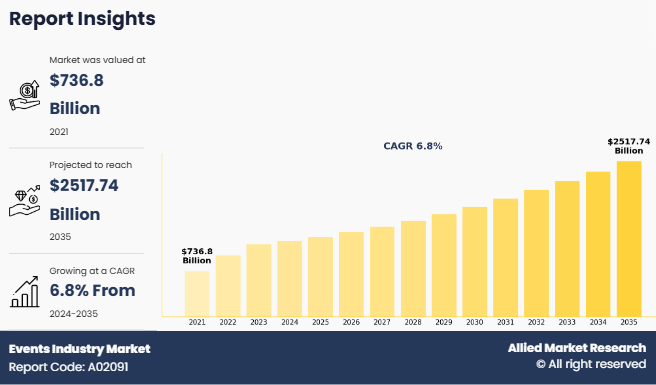
Market dynamics
The event industry has undergone rapid digital transformation, driven by advancements in technology that are reshaping how events are planned, executed, and experienced. Virtual platforms, AI-powered tools, and data analytics are becoming central to event management, allowing organizers to streamline operations, improve attendee experiences, and analyze post-event metrics in real-time. Live streaming and virtual events have gained significant traction, especially post-pandemic, expanding the reach of events to global audiences. In addition, immersive technologies such as augmented reality (AR) and virtual reality (VR) are used to enhance attendee engagement, offering interactive environments and personalized experiences. These innovations are not just trends but have become the basis that are expected to continue to drive the event market growth.
Corporate events such as conferences, trade shows, and exhibitions have become integral to business marketing strategies. Companies are increasingly utilizing these events to enhance brand visibility, launch new products, and connect with potential clients and partners. Corporate events offer a unique opportunity for face-to-face engagement in an era where most of business interaction has shifted online. In addition, the rise of corporate networking events, industry-specific forums, and workshops reflects a growing focus on knowledge exchange and collaboration. This demand is further propelled by globalization, as businesses seek to expand their networks across borders, creating opportunities for more international corporate events.
This trend of heightened sponsorships highlights the pivotal role events play in the modern business landscape, making it a key driver of market growth and competitiveness. Event sponsorship is a crucial strategic investment for businesses seeking enhanced brand visibility and targeted marketing opportunities. Sponsorship is used to provide financial assistance to an event or organization. In addition, sponsorship allows the main players to advertise their products and reach a diverse consumer base, which ultimately increases product acceptance. Tax deductions on sponsorship expenses present added incentives for businesses to capitalize on these opportunities, maximizing returns on their marketing investments. This event sponsorship offers a comprehensive array of benefits that facilitate the achievement of marketing, branding, and financial objectives of the business. Moreover, it also promotes brand loyalty and helps to concentrate on consumer preferences. Furthermore, events are a great way to attract and engage both current and potential customers, which helps to build stronger brand loyalty.
However, the process of event organization entails intricacies and significant expenditures that consists of various cost factors that collectively contribute to the overall operational outlay. These expenses include on-site fees, venue costs, food and catering expenditures, event rentals, entertainment expenses, and production costs. On-site expenses entail charges imposed by the event venue, which can significantly add to the overall budget of the event. In addition, venue costs comprise various components such as security deposits, room rentals, insurance coverage, and parking fees. The food and catering aspect involve the cost of providing beverages, meals, and labor fees for servers, among other related expenses.
The evolution of event management was significantly influenced by technological advancements, transforming the way communication and transactions take place in real time. Online booking, phone calls, emails, and video conferences have revolutionized event planning, making it cost-effective and easily accessible. This shift in approach enabled event organizers to reach a broader customer base through various creative means facilitated by digital evolution. The proliferation of smartphones, desktop apps, and mobile apps played a pivotal role in streamlining event organization, which thus makes it more efficient and manageable. These technological tools empowered individuals to organize, coordinate, and execute tasks with ease and minimal time and effort investment.
As a result, events are conducted seamlessly through webinars and video conferences, which is expected to open lucrative opportunities for market expansion in the future. With the help of technology, event managers can now efficiently handle event logistics, registration, and ticketing processes, leading to enhanced attendee experiences and increased satisfaction. Moreover, real-time communication tools facilitate better coordination among event teams, which ensures smoother execution and reduced chances of errors. In addition to optimizing internal processes, technology paved the way for enhanced customer engagement and personalization.
Event organizers can leverage data analytics to understand the preferences and behaviors of attendees and may tailor the event experiences to suit individual needs. This not only boosts customer satisfaction but also strengthens brand loyalty and increases the likelihood of repeated attendance. Furthermore, the trend of online events through webinars and video conferences is expected to grow continuously. This presents new opportunities for businesses to expand their market reach beyond geographical boundaries, tapping into global audiences and fostering international collaborations.
Segmental overview
The events industry market is segmented into type, revenue source, organizer, age group, origin of attendees, event location, and region. By type, the market is divided into music concerts, festivals, sports, exhibitions & conferences, corporate events & seminars, and others. On the basis of revenue source, it is segregated into ticket sales, sponsorship, and others. As per organizer, it is categorized into corporate, sports, education, entertainment, and others. By age group, it is fragmented into below 20 years, 21–40 years, and above 40 years. By origin of attendees, the market is segmented into national, continental, and transcontinental. By event location, it is categorized into tier 1 cities, tier 2 cities, and tier 3 cities. Region-wise, the market is analyzed across North America, Europe, Asia-Pacific, and LAMEA.
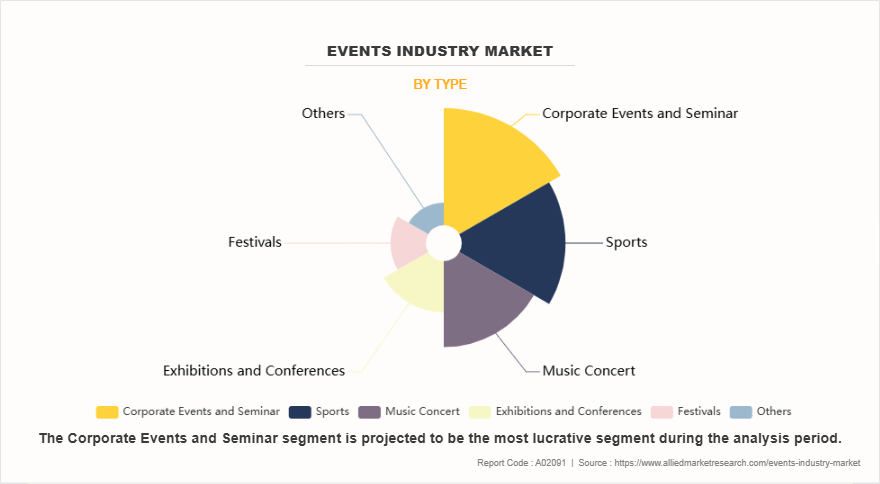
By type
The corporate events and seminars segment, as per type, dominated the global market in 2023 and is anticipated to maintain its dominance throughout the events industry market forecast period. Corporate events and seminars are organized to create a learning-by-doing atmosphere through experiments, discussions, and interactions among participants. They comprise various types of gatherings, such as conventions, symposia, congresses, incentive group events, marketing events, special celebrations, seminars, courses, public or trade shows, product launches, exhibitions, company general meetings, corporate retreats, study tours, or training programs. Corporate events & seminars play a crucial role in fostering and reinforcing relationships with current and potential clients and agencies, while also serving as a means of inspiring and motivating employees, stakeholders, and business associates through effective messages.
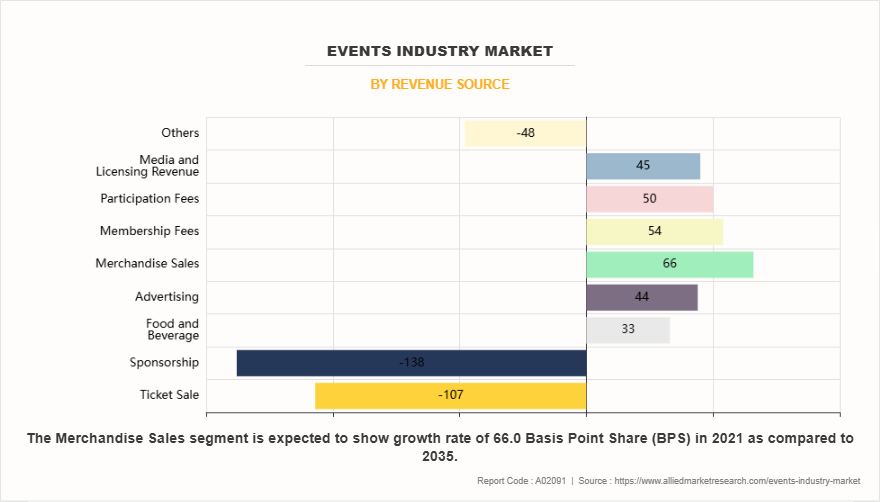
By revenue source
As per revenue source, the sponsorship segment dominated the global events industry market in 2023 and is anticipated to maintain its dominance throughout the forecast period. Sponsorship plays a crucial role in effective marketing due to its ability to enhance event programs and offset increasing expenses. It serves as a potent complement to other marketing initiatives, as it effectively delivers messages to the target audience and helps to build brand awareness. Thus, by sponsoring events, businesses can expand their reach to potential buyers and customers, ultimately driving sales. These factors are expected to contribute to the growth of the market in the future.
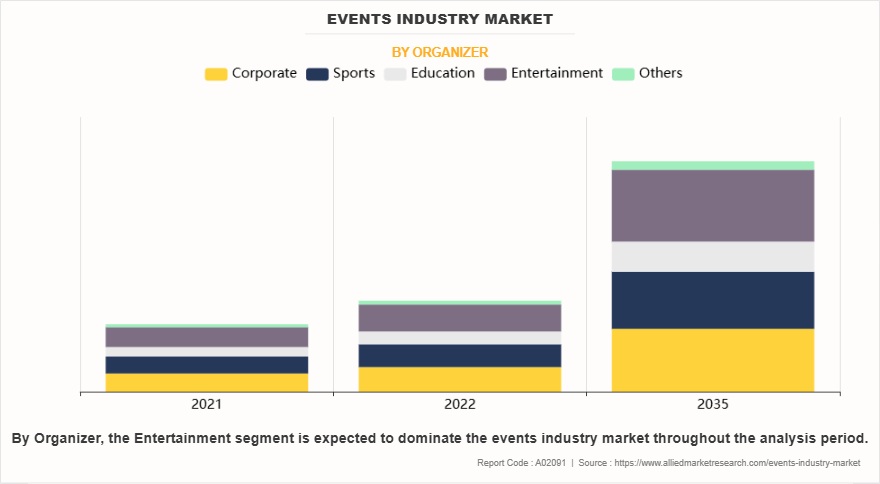
By organizer
As per organizer, the entertainment segment dominated the global events industry market in 2023 and is anticipated to maintain its dominance throughout the forecast period. The entertainment industry comprises club festivals that feature music conferences and international music professionals. These conferences bring together performing artists and speakers from around the globe to network and share ideas. The lineup of speakers includes entrepreneurs, artists, producers, and industry leaders. These events primarily aim to innovate, educate, and inspire professionals in the electronic music field and foster discussions on new technologies and social & environmental responsibility. Event management companies prioritize aspects such as social media presence, on-site food offerings, live music experiences, virtual reality encounters, and other amenities.
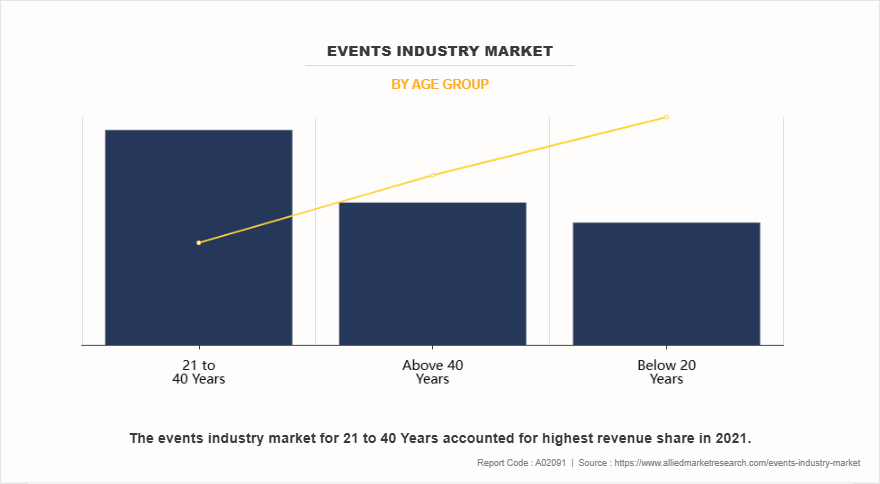
By age group
As per age group, the 21-40 years segment dominated the global market in 2023 and is anticipated to maintain its dominance throughout the forecast period. The significant growth of this market, especially among individuals aged between 21 and 40 years, can be attributed to their enthusiastic engagement in diverse events, including exhibitions, conferences, seminars, and music concerts. This age group actively participates in various gatherings and shows, contributing to the overall market expansion. In addition, there is a rising interest in entrepreneur and business-focused seminars and conferences, where young individuals who seek to establish their own ventures can gain valuable guidance and insights. Aspiring entrepreneurs find these events beneficial in gaining essential knowledge and direction, which further fuels the market expansion within this age segment. The rising popularity of music concerts and festive gatherings is also expected to positively impact the overall events industry market growth.
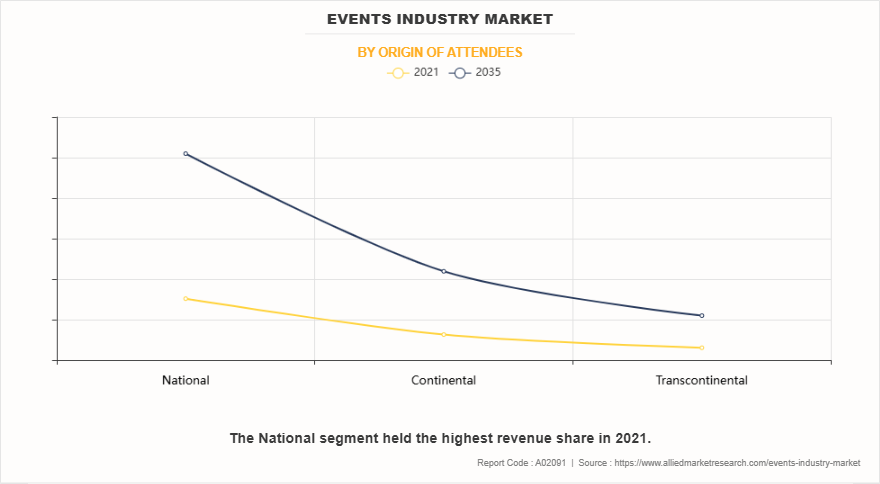
By origin of attendees
Based on origin of attendees, the national segment held the major share of the market in 2023. Local events tend to draw attendees from within the host country due to the ease of travel, reduced costs, and the relevance of the event to domestic industries or communities. Public initiatives and regional gatherings focused on national topics generally draw an audience from within the country. A strong domestic economy and well-developed infrastructure, including road networks, public transport, and event-friendly venues, make national participation easier.
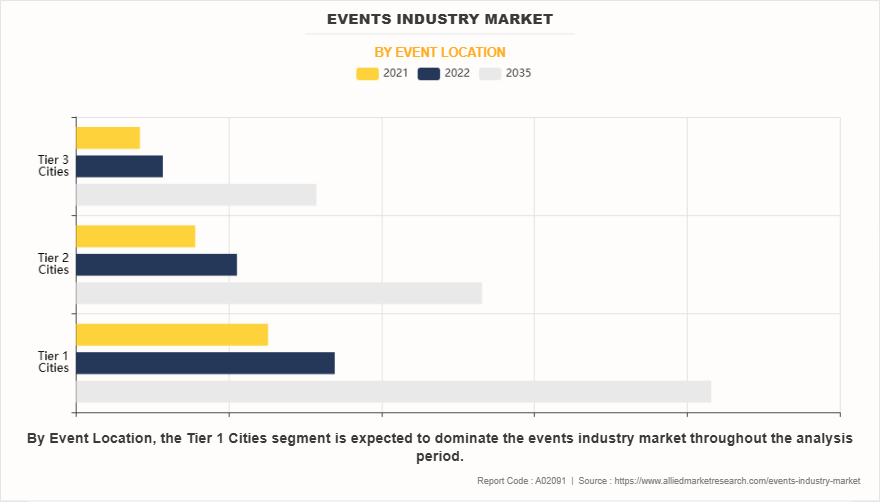
By event location
Based on event location, the tier 1 cities segment held the major events industry market share in 2023. Tier 1 cities are driven by their world-class infrastructure, international airport hubs, and established reputation as business and cultural centers. These cities typically have a high concentration of multinational corporations, major conference venues, five- star hotels, and advanced transportation systems, making them prime locations for international and large-scale events. Global connectivity through direct flights, along with a well-developed tourism industry, ensures high attendance. The presence of a diverse and affluent population, strong media coverage, and a robust service sector further enhance the appeal of Tier 1 cities for events, making them ideal for high-profile corporate events, global conferences, and international exhibitions.

By region
Region-wise, Europe garbered the major share of the market in 2023. Germany and Spain are expected to experience the highest increase in activity, with various types of meetings witnessing growth in both numbers and attendees. Companies in the region have become more prudent with their spending, which thus leads to a demand for events within closer proximity and at mid-scale venues such as conferences, seminars, and festivals. Europe has been successful in attracting international association conferences, with over half of the top destinations for such conferences located in the region. The market in Europe experiences further growth due to increase in the adoption of smart devices and internet usage, which resulted in a gradual rise in online bookings for music concerts, sports events, and other gatherings. Moreover, owing to the substantial impact on the GDP of western European countries such as the UK, Germany, the Netherlands, Belgium, and Czechia, European governments actively support and promote the events sector.
The market in Asia-Pacific is experiencing rapid growth driven by strong economic expansion, regional cooperation, and intellectual advancement. Countries in the region have witnessed an increase in sports leagues, digital activation, and adoption of innovative technology. The growing interest of youth, particularly in India and China, in attending conferences, exhibitions, concerts, shows, and other events is contributing to market growth. The robust economic growth in the region provides attractive business opportunities for investors, while high internet and technology penetration in densely populated countries enhances awareness about upcoming events. Social media has emerged as a crucial tool to reach a wide audience and understand preferences to conduct successful events. Thus, Asia-Pacific region is expected to boost in terms of market growth in coming years.
Competition analysis
The major players analyzed for the events industry market are Access Destination Services, BCD GROUP (BCD MEETINGS & EVENTS), ATPI Ltd., Riviera Events, Entertaining Asia, Live Nation Worldwide Inc., StubHub, Anschutz Entertainment Group, Pollstar, Cvent Inc.,Capita Plc., Reed Exhibitions, Questex LLC, Outback Concerts, The Freeman Company, Penguins Limited, CL Events, Seven Events Ltd., Clarion Events Ltd., and Versatile Event Management.
Manufacturers in the market are actively engaged in meeting dynamically changing customer demands by continuous production of new and innovative services with enhanced features. These market players invest in research and development to drive innovation, improve functionality, and provide greater choice to their customers. As a result of which they collaborate with production partners, regulatory bodies, and industry stakeholders to navigate different services, regulatory compliance, and stay ahead of industry trends. Manufacturers are focused on expansion of their services while optimizing costs, which may help them to cater to the increase in events industry market demand from customers.
Key Benefits For Stakeholders
- This report provides a quantitative analysis of the market segments, current trends, estimations, and dynamics of the events industry market analysis from 2021 to 2035 to identify the prevailing events industry market opportunities.
- The market research is offered along with information related to key drivers, restraints, and opportunities.
- Porter's five forces analysis highlights the potency of buyers and suppliers to enable stakeholders make profit-oriented business decisions and strengthen their supplier-buyer network.
- In-depth analysis of the events industry market segmentation assists to determine the prevailing market opportunities.
- Major countries in each region are mapped according to their revenue contribution to the global market.
- Market player positioning facilitates benchmarking and provides a clear understanding of the present position of the market players.
- The report includes the analysis of the regional as well as global events industry market trends, key players, market segments, application areas, and market growth strategies.
Events Industry Market Report Highlights
| Aspects | Details |
| Market Size By 2035 | USD 2.5 trillion |
| Growth Rate | CAGR of 6.8% |
| Forecast period | 2021 - 2035 |
| Report Pages | 562 |
| By Origin of Attendees |
|
| By Revenue Source |
|
| By Organizer |
|
| By Age Group |
|
| By Type |
|
| By Event Location |
|
| By Region |
|
| Key Market Players | Clarion Events Limited, CL Events, Access Destination Services, LLC, Eventbrite, ATPI Ltd., Live Nation, Cvent Holding Corp., Anschutz Entertainment Group, DRPG Group, Capita plc., BCD Group International BV |
Analyst Review
According to the perspective of the top-level CXOs, the events industry is growing at a significant pace and is anticipated to continue this trend in the coming years. Events play a vital role in revenue generation and brand equations for corporates and associations. It has been witnessed that events of recent years are equally interesting than the past decade, driving shifts in choice and pressurizing event planners and owners. This industry is witnessing the entry of new and independent players who are leveraging technology to gain a competitive advantage in today’s consolidated environment. However, companies are facing challenges in this industry to manage live inventory for simple and small events. Conversely, the focus of companies is to enhance the attendee experience and witness the successful completion of an event without any hindrance.
The events industry serves as a potent means for businesses to establish meaningful connections with their customers, employees, and partners. In an increasingly digital world, the events sector is expected to undergo further advancements and expansion. By leveraging events, companies can foster valuable relationships, enhance brand visibility, and create impactful experiences that contribute to their overall success and growth. In response to the ongoing evolution of technology and shifting consumer preferences, businesses will proactively adjust their event strategies to maintain relevance and effectively engage their target audiences. Moreover, the demand for corporate events is increasing as businesses look for new ways to engage their employees and customers. Nowadays, customers look for experiences that are memorable and meaningful, as they provide unique experiences. In addition, they believe the event industry is well-positioned to meet this demand in the coming years
The global event industry market was valued at $ 736.8 billion in 2021 and is projected to reach $ 2517.74 billion by 2033, registering a CAGR of 6.8% from 2024 to 2033.
The events industry is segmented into type, revenue source, organizer, age group, origin of attendees, and event location and region.
Europe is the largest regional market for event industry
The major players analyzed for the global events industry market are Access Destination Services, BCD GROUP (BCD MEETINGS & EVENTS), ATPI Ltd., Riviera Events, Entertaining Asia, Live Nation Worldwide Inc., StubHub, Anschutz Entertainment Group, Pollstar, Cvent Inc., Capita Plc., Reed Exhibitions, Questex LLC, Outback Concerts, The Freeman Company, Penguins Limited, CL Events, Seven Events Ltd., Clarion Events Ltd., and Versatile Event Management
The global event industry market report is available on request on the website of Allied Market Research.
Loading Table Of Content...
Loading Research Methodology...



